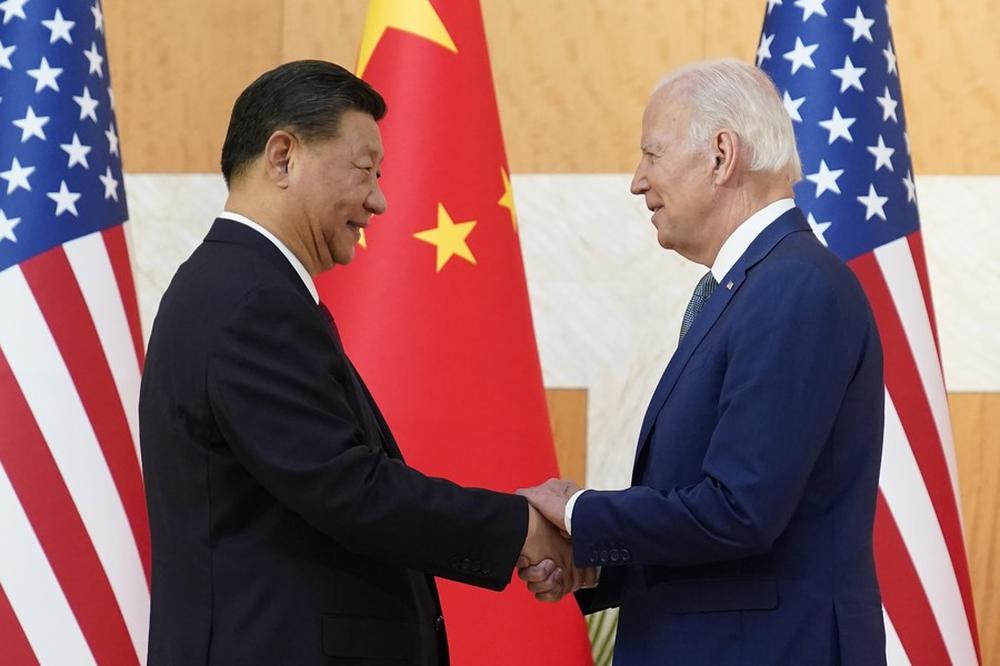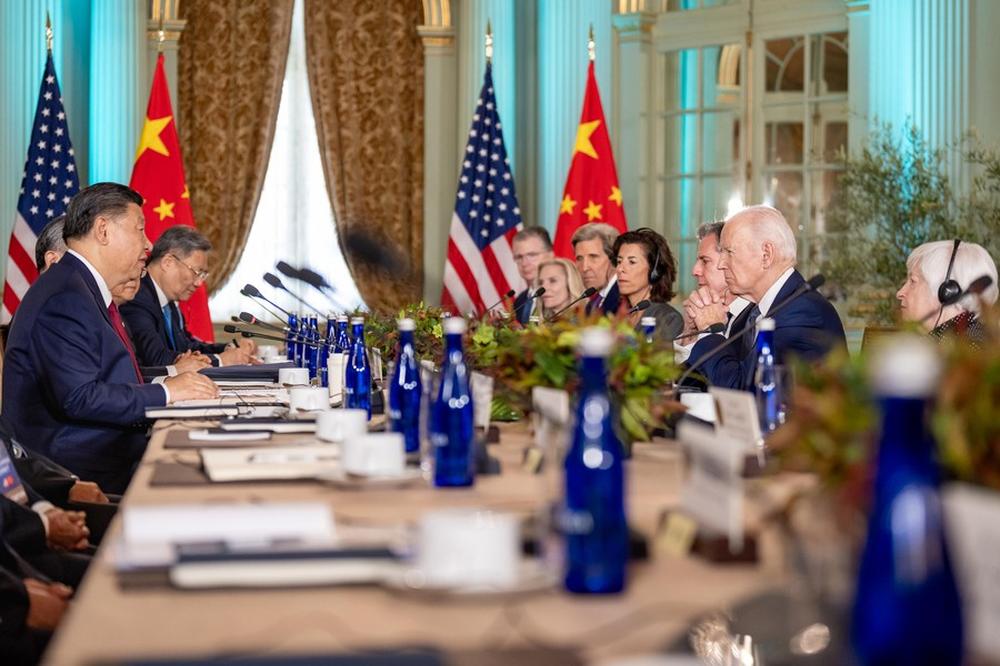- #China
- #Global Issues
- #US Foreign Policy

► The chances of improvement in US-China relations seem low, despite the accomplishments made after last week’s meeting.
► Measures announced in the meeting are hardly new to the bilateral relationship, suggesting that they can be canceled or not followed through at all.
► Although both recognize the importance of the U.S.-China relationship, China’s arduous actions to build strategic partnerships and expand military cooperation are threatening the US-led postwar liberal international order.
The much-anticipated summit between U.S. President Joe Biden and Chinese leader Xi Jinping in San Francisco affirmed that the chance for improved U.S.-Sino relations in the near term remains low. This is not to downplay the accomplishments of last week’s meeting. The two leaders agreed to:
1) Resume high-level military-to-military communication on defense and maritime security;
2) Resume cooperation to combat illicit drug manufacturing and trafficking;
3) Address the risks of advanced artificial intelligence (AI) and improve AI safety;
4) Accelerate efforts to tackle climate change;
5) Increase scheduled passenger flights in early 2024 and restore full implementation of the U.S.-China air transportation agreement;
6) Encourage increased educational, cultural, sports, and business exchanges;
7) Follow up on the above agreements with continued high-level diplomacy and working-level consultations.
However, a careful assessment of the substantive outcome of this meeting suggests that the two sides will need to accomplish far more if they are serious about overcoming the structural impediments to improved relations.
For one, the above-announced measures are hardly new to the bilateral relationship, suggesting that just as quickly as they can be reinstated, they can be canceled or not followed through at all. Take, for instance, the mil-mil communication line. This confidence-building measure was cut off when then-Speaker of the House Nancy Pelosi visited Taiwan in 2022. Concerning cooperation on illicit drug trafficking, President Xi agreed to crack down on fentanyl exports to the United States in 2019, but its precursors continued to be shipped from China to Mexico where the cartels repackaged the drugs for eventual distribution in the United States. Only time will tell if any of these measures will survive the test of time.
But the events of this meeting suggest that the agreed measures rest on shaky grounds. President Biden, for instance, began his post-summit press briefing by characterizing it as “most constructive and productive,” but ended the session by stating that Xi is a “dictator.” Not surprisingly, Xi Jinping’s call for “mutual respect, peaceful coexistence, and win-win cooperation” was quickly replaced by the Chinese Foreign Ministry’s biting response to Biden’s remark, calling it “extremely wrong and irresponsible political manipulation.” What this episode also illustrates is the fundamental ideological divide between China’s authoritarian form of governance and American democracy.
Even more dire is where both leaders stood on the most consequential issues plaguing the bilateral relationship. For example, the two leaders failed to announce any agreements on export controls or investment-related restrictions. Xi stated that the trade and investment-related measures targeting Chinese entities “seriously hurt China’s legitimate interests.” To this, President Biden responded that his administration “will continue to take necessary actions to prevent advanced U.S. technologies from being used to undermine [U.S.] national security” and that “the PRC’s unfair trade policies, non-market economic practices and punitive actions against U.S. firms” harm American workers and businesses.
On the issue of Taiwan, Xi Jinping stated that “the Taiwan question” was “the most important and most sensitive issue in China-U.S. relations” and that the U.S. “should take real actions” to not support “’ Taiwan independence,’ stop arming Taiwan, and support China’s peaceful reunification.” President Biden commented that the U.S. “opposes any unilateral changes to the status quo” and “called for restraint in the PRC’s use of military activity in and around the Taiwan Strait.”
Biden raised other issues that would go against Xi Jinping’s principled approach to U.S.-Sino relations. For instance, Biden reiterated the importance of human rights in Xinjiang, Tibet, and Hong Kong. He also maintained the U.S. position on supporting Ukraine’s right to emerge from the conflict with Russia “as a democratic, independent, sovereign, and prosperous nation” and Israel’s “right to defend itself against terrorism.” Finally, President Biden reaffirmed the U.S. support for a “free and open Indo-Pacific,” while committing to defend U.S. allies in the region and supporting freedom of navigation in the South China Sea and East China Sea as well as “the complete denuclearization of the Korean Peninsula.”
For President Xi, these issues would directly challenge China’s approach to the bilateral relationship, which rests on “mutual respect” and “peaceful coexistence.” The former upholds basic respect for the different histories of development and social systems of China and the United States. The latter, to use Xi’s own words, refers to neither country “bet[ting] against” each other or interfering in the other’s “internal affairs.”
President Xi said in his opening remarks that the U.S.-China relationship is “the most important bilateral relationship in the world” and that “Planet Earth is big enough for the two countries.” But he was also quick to press President Biden to accept the “accelerating global transformations unseen in a century,” which is a code for realizing China’s re-envisioned international order.
Over the years, Beijing has worked assiduously to build strategic partnerships and expand military cooperation with Russia, Iran, and Pakistan. Chinese-led multilateral mechanisms have grown under headings like the Asian Infrastructure Investment Bank (AIIB), Shanghai Cooperation Organization, Forum on China-Africa Cooperation, and China-Arab States Cooperation Forum. These all threaten the postwar liberal international order that the United States has worked to build and maintain.
President Xi can try to convince the world that “major country competition is not the prevailing trend of current times and cannot solve the problems facing China and the United States.” But his open support for the promotion of “great rejuvenation of the Chinese nation on all fronts through Chinese modernization” includes increasing military coercion. According to the Department of Defense, the incidence of intercepting U.S. allied, and partner vessels and aircraft operating in international air and waters in the Indo-Pacific region has increased significantly in recent years. China’s military modernization is also increasing at a rapid pace with the number of operational nuclear warheads as of May 2023 being 500.
As much as both sides would like to avoid escalating tensions, the fact of the matter is that a communist China is still viewed as a direct threat to the interests of the United States in the international system. Such is the tragedy of great power politics as John Mearsheimer calls it. What this meeting affirms is that this reality cannot be wished away easily and that the United States remains committed to “its interests, its values, and its allies and partners.” As President Biden reiterated during his press conference, “the United States will continue to compete vigorously with the PRC.” Xi Jinping’s statements and China’s approach to bilateral relations appear to be viewed no differently in Washington.
Seen in this light, this meeting was less an attempt to change the trajectory of the bilateral relationship than an effort to manage and stabilize the strategic competition between China and the United States. Failure to do so could lead to grave consequences which can befall any tragedy of great power competition.
